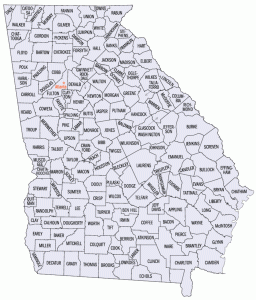On April 2, 2019, Georgia’s Legislature passed a statute creating the “State-wide Business Court.” As the name makes clear, under this statute the Business Court’s jurisdiction reaches throughout all of Georgia. It now goes to the Governor for review. If it becomes law, this new business court will commence operations on January 1, 2020, and start taking cases on August 1, 2020. A copy of the State-wide Business Court statute can be found here.
The Business Court Judge
The Business Court will have a single judge, sitting in Macon, Georgia. Among other things, the Business Court judge must have “[a]t least 15 years of legal experience in complex business litigation….” The judge will be appointed by the Governor, subject to majority approval of the State House and Senate Judiciary Committees, and will serve a five-year team. A Business Court judge may be reappointed under the same process governing the original appointment. The first Business Court judge could be appointed as early as December 31, 2019, but should be appointed with sufficient time to start hearing cases on August 1, 2020.

Business Court Rules
The Business Court judge is required to develop rules for the Business Court, subject to Supreme Court approval. The judge is empowered to empanel an 8-member commission to develop these rules. The rules have discretionary and mandatory components. Thus, the “rules may include a matrix or guidelines for the acceptance of cases by the State-wide Business Court, including, but not limited to, such factors as the amount in controversy, the existence of novel or complex legal issues, and anticipated discovery issues needing the intervention of the State-wide Business Court.” The rules, however, “shall include guidelines and procedures for the filing of pleadings, petitions, motions, and all other documents, electronically or otherwise, with the State-wide Business Court.”
Business Court Staffing
The Business Court will be staffed beyond the appointed judge. There will be a salaried clerk, law clerks, staff attorneys, stenographers, and assistants. The Business Court judge and Business Court clerk “shall be responsible for designating an electronic filing system and the procedures for filing that shall be articulated in the rules of the State-wide Business Court.” The law also provides generally for a budgeting process and certain types of expected expenditures on legal materials needed to operate a well-functioning court.
The State-wide Business Court is not the Exclusive Georgia Business Court
The new law makes clear, however, that individual county courts can maintain or create their own business court dockets as well: “Nothing in this chapter shall preclude a superior court from creating a business court division for its circuit or preclude a state court from creating a business court division, in the manner provided by law.” Thus, there is no requirement that the 14-year old Metro Atlanta Business Court cease operations. That court functions within the Fulton County Superior Court and encompasses both Fulton and Gwinnett Counties.
Venue for Business Court Litigation and Trial
Business Court cases must be tried in the county mandated by the state constitution, but pre-trial matters may be handled in Macon, with the statute giving the judge discretion to “conduct pretrial proceedings by means of telephone, video conferencing, or other efficient technological means as may be deemed necessary or useful to conserve the resources of the parties or the court pursuant to the rules of the State-wide Business Court.” [Note: We recently posted observations on similar practices concerning pre-trial and trial court sites in North Carolina’s Business Court and in the expanded Wisconsin Business Court.]

Business Court Jurisdiction
The new court’s case type jurisdiction is quoted at length below. Among other things, the State-wide Business Court has concurrent jurisdiction over domestic and international arbitration matters, trade secrets, IP, securities, corporation law, UCC disputes, partnerships, LLCs, internal governance disputes, non-competes, professional malpractice involving businesses, business torts, commercial contract disputes, commercial real property, e-commerce agreements, technology licensing agreements, and IP licensing.
In pure damage actions, commercial property disputes must have a minimum of $1 Million in controversy, and all other case types must have at least $250,000 at issue.
The State-wide Business Court will also have concurrent jurisdiction and equity powers “to the extent that such powers are exercised in claims arising under federal law over which courts of this state have concurrent jurisdiction to the extent such claims are provided for under paragraph (1) of this subsection….”
The State-wide Business Court has supplemental jurisdiction over non-Business Court matters if they arise out of the same case or controversy forming the basis of claims subject to Business Court jurisdiction.
All Parties Must Agree to Business Court Jurisdiction
All parties must agree to State-wide Business Court jurisdiction. If the case is filed in the Business Court, the defendant can petition to transfer the case to the regular docket, “unless the action involves a contract claim or dispute where all parties are persons engaged in business or business entities and such contract provides that such dispute shall come before the State-wide Business Court.” The new law forbids a Business Court choice of forum provision in consumer contracts.
If the action is filed on the regular docket, defendants can petition to move it to the Business Court. However, a plaintiff’s opposition dooms such a motion unless there is the kind of contractual choice of forum provision describe immediately above; and again, the new law makes clear consumer contracts cannot include a forum selection clause naming the Business Court. Assuming all parties agree to the Business Court hearing a case, the Business Court Judge must still decide if the action properly comes within Business Court jurisdiction, and clearly has discretion to reject a joint request.
Some Differences with Originally Proposed Legislation
Georgia’s House and Senate proposed different versions of a business court bill. Some notable differences from earlier drafts with the final law are that the filing fee will be $1,000, not $5,000. Moreover, there will not be jurisdiction over all cases arising under federal statutes over which states have concurrent jurisdiction, but only federal law cases that fall within the case types defining Business Court jurisdiction.
There were also some differences over whether a single party’s request to get on the Business Court docket could be sufficient, but the new law ultimately provided that all parties must agree to litigate in the Business Court, subject to the judge’s final approval.
We note the House sought to locate the Business Court in Atlanta, but both branches ultimately agreed to locate the new court in Macon.
Finally, the drafters added language during the legislative process making clear that individual Georgia Superior or State Courts could establish a business court division on their local dockets. Thus, it would not be surprising to see the Fulton County Superior Court continue the Metro Atlanta Business Court.
STATUTORY LANGUAGE ON JURISDICTION
15-5A-3. (a) Except as provided in subsection (b) of this Code section, pursuant to the process provided for in Code Section 15-5A-4, the State-wide Business Court shall have authority to:
(1) Exercise concurrent jurisdiction and the powers of a court of equity, to the extent that such powers are exercised:
(A) Notwithstanding the amount in controversy, where equitable relief is requested in claims:
(i) Arising under Part 1 of Article 1 of Chapter 9 of Title 9, the ‘Georgia Arbitration Code’;
(ii) Arising under Part 2 of Article 1 of Chapter 9 of Title 9, the ‘Georgia International Commercial Arbitration Code,’ for which an application may be made to a court of this state;
(iii) Arising under Article 27 of Chapter 1 of Title 10, the ‘Georgia Trade Secrets Act of 1990’;
(iv) Involving securities, including, but not limited to, disputes arising under Chapter 5 of Title 10, the ‘Georgia Uniform Securities Act of 2008’;
(v) Arising under Title 11, the ‘Uniform Commercial Code’;
(vi) Arising under Chapter 2 of Title 14, the ‘Georgia Business Corporation Code’;
(vii) Arising under Chapter 8 of Title 14, the ‘Uniform Partnership Act’;
(viii) Arising under Chapter 9 of Title 14, the ‘Georgia Revised Uniform Limited Partnership Act’;
(ix) Arising under Chapter 9A of Title 14, the ‘Uniform Limited Partnership Act’;
(x) Arising under Chapter 11 of Title 14, the ‘Georgia Limited Liability Company Act’;
(xi) That relate to the internal affairs of businesses, including, but not limited to, rights or obligations between or among business participants regarding the liability or indemnity of business participants, officers, directors, managers, trustees, or partners;
(xii) Involving registration and use of trademarks, service marks, and trade names, including, but not limited to, disputes arising under Article 16 of Chapter 1 of Title 10;
(xiii) Involving noncompetition or nonsolicitation covenants;
(xiv) Where the complaint includes a professional malpractice claim arising out of a business dispute;
(xv) Involving tort claims between or among two or more business entities or individuals as to their business or investment activities relating to contracts, transactions, or relationships between or among such entities or individuals;
(xvi) Involving claims for breach of contract, fraud, or misrepresentation between businesses arising out of business transactions or relationships;
(xvii) Arising from e-commerce agreements; technology licensing agreements, including, but not limited to, software and biotechnology license agreements; or any other agreement involving the licensing of any intellectual property right, including, but not limited to, an agreement relating to patent rights; and
(xviii) Involving commercial real property; and
(B) When damages are the only relief requested and the amount in controversy is at least:
(i) One million dollars for claims under subparagraph (A) of this paragraph involving commercial real property; or
(ii) Two hundred and fifty thousand dollars for claims under subparagraph (A) of this paragraph not involving commercial real property;
(2) Exercise concurrent jurisdiction and the powers of a court of equity, to the extent that such powers are exercised in claims arising under federal law over which courts of this state have concurrent jurisdiction to the extent such claims are provided for under paragraph (1) of this subsection;
(3) Have supplemental jurisdiction over all pending claims that are so related to the claims in cases provided for under paragraph (1) or (2) of this subsection that such pending claims form part of the same case or controversy;
(4) Punish contempt by fines not exceeding $1,000.00, by imprisonment not exceeding 20 days, or both; and
(5) Exercise such other powers, not contrary to the Constitution, as are or may be given to such a court by law.
